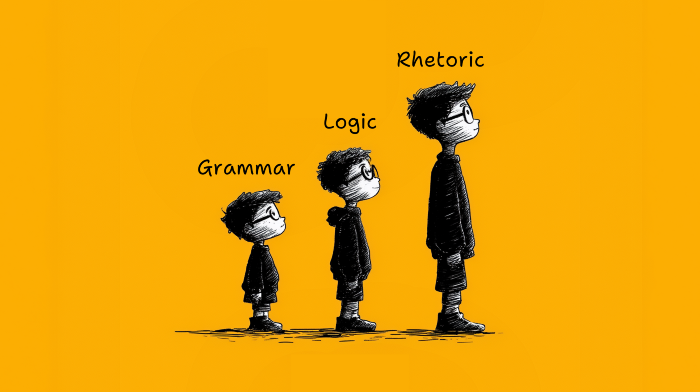I did not start out to write a critique of Classical Conversations. Our family has been a part of it for 5 years, and at present, we plan to continue to be (with supplementation). My initial goal was to write about the history of classical Christian education (CCE) and my growing understanding of it, but I found that to begin, I needed to lay the groundwork of where we've been.
My wife and I have been pursuing a classical Christian education for our children since at least 2019. Much of that time has been spent in Classical Conversations, and while we've enjoyed our time there, the more I've learned about CCE, the more I've felt something was missing.
Our oldest child just entered the Essentials program (second stage) of Classical Conversations last year, so I admit that I may just be missing the broader, overarching vision of CC that comes through completing the program. Regardless, I still have critiques.
The Trivium As Developmental Stages
Classical Conversations is very focused on the Dorothy Sayers model of the Trivium as developmental stages. The book "The Core" by Leigh Bortins, the founder of Classical Conversations, was one of my earliest introductions to CCE. At the time, I found Sayers' insight, as implemented by Classical Conversations, to be compelling.
For those unfamiliar with the concept, Sayers' proposed that the 3 parts of the Trivium (grammar, dialectic/logic, and rhetoric) closely align with the developmental stages of a child:
- Grammar stage - In the younger years, children are sponges, absorbing any information that you give them. Therefore, it's to our advantage to give them the grammar (basic facts) of many subjects at this age so they can commit it to memory. We'll draw from this well of facts in later years.
- Dialectic, or Logic stage - preteens tend to naturally be argumentative. Given this, let's teach them to argue well, thinking clearly and avoiding logical fallacies, etc.
- Rhetoric - Teens often feel the need to prove themselves and present themselves well. What better way to do this than through their speech? At this stage we teach them to eloquently deliver the thoughts they've developed through the dialectic stage, based on information memorized during the grammar stage.
I do believe that Sayers' insight here is remarkable. I've been amazed at the number of history facts that my "grammar aged" children have picked up through song. That being said, it is a disservice to our children and to ourselves if we hold too tightly to this framework of ages & stages. We risk believing, or modeling, that older children, or adults can no longer learn the grammar of subjects, or how to wrestle with and reason about new ideas. If we were not taught rhetoric in high school, we may believe that there no hope for us to learn to share ideas with others in a compelling way.
While I don't necessarily believe that the leaders of Classical Conversations see the world this way, I do believe (and have observed that) it can start to unconsciously creep into the mindsets of parents who progress their children through the "stages" of the Trivium as they grow older.
The Trivium Doth Not a Classical Education Make
The Trivium is a great start to Classical Education, but it is less than half of the story. As I said above, the Trivium is made up of Grammar, Logic (sometimes called dialectic), and Rhetoric. These can be viewed as the arts of language.
There is also the Quadrivium, meaning the four ways. This included Arithmetic, Music, Geometry, and Astronomy. Just as the Trivium can be viewed as the arts of language, these can be seen as the arts of number:
- Arithmetic (the art of pure number)
- Music (the art of number as applied to time)
- Geometry (the art of number as applied to space)
- Astronomy (the art of number as applied to time and space)
Together, the Trivium and Quadrivium made up the seven liberal arts (arts of a liberated, or free, people). These were considered prerequisites (preparatory disciplines that formed the mind) for the study of higher subjects such as philosophy and theology, which was considered the queen of the sciences.
Content & Method
The CC content is a great start. As I said above, I've been amazed at the number of facts that my children have absorbed through the Foundations (grammar stage) program. That being said, I find it to be lacking. They memorize lists of things, but with no context or details about the items on the list, just rote memorization.
I do believe there is a place for rote memorization. My kindergarten through second grade years were spent in a private school that focused on rote memorization of phonograms and math tables, something I've missed about CC since it's not a complete curriculum. For a long time my critique has been around the missing information.
The more I've learned about classical education, the more my concern has become the fact that the primary focus is on information transfer, with little room for cultivating wonder, and going deep into topics that interest students. The memorization content can sometimes feel a mile wide and an inch deep. My guess is that CC would say that going deep into content happens in the Essentials program ("dialectic stage") or Challenge program ("rhetoric stage"), but this goes back to the "ages and stages" problem, and an opportunity is missed. Younger years are the ideal time to start cultivating wonder, and this just cannot happen in a program where rote memorization is the primary focus.
It has also been my observation that Classical Conversations puts methodology on an equal footing with content. The way that the program is set up there are local campus directors, as well as regional representatives. A regional representative will typically visit a campus once or twice per year, where they'll observe tutors (teachers) and provide feedback to the director on how to do things the Classical Conversations way (being sure to repeat each memorization fact 7 times, for example).
I also care about methodology, but have a different view on what is a priority. A classical classroom should leave room for rabbit trails whenever students show interest; it should seek to integrate subjects whenever possible because they all originate in and declare the glory of God; most of all it should cultivate wonder and develop a love for the good, the true, and the beautiful. Our primary goal is soul formation not the transfer of information.


Member discussion